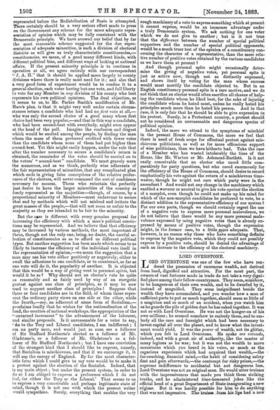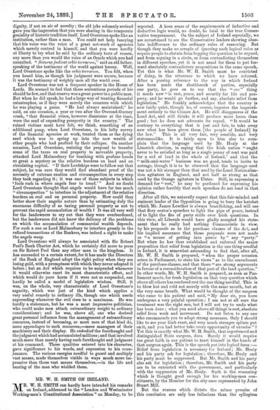LORD OVERSTONE.
T ORD OVERSTONE was one of the few who have ren- dered the possession of enormous wealth, not derived from land, dignified and attractive. For the most part, the owners of vast fortunes made in trade do not take a very digni- fied place among their fellow-countrymen. They seem, sordehovr, to be hangers-on of their own wealth, and to be dwarfed by it, instead of magnified. They seem insignificant beside the wealth they have accumulated, and you wonder how a man of sufficient parts to put so much together, should seem so little of a magician and so much of an accident, when you watch him as he guards the pile of golden dust he has raked together. It was not so with Lord Overstone. He VMS not the hanger-on of his own millions ; he seemed somehow to embody them, and to em- body all the care and foresight which had been necessary to invest capital all over the planet, and to know what the invest- ment would yield. It was the power of wealth, not its glitter, which you felt in Lord Overstone. He spoke ore rotund°, indeed, and with a great air of authority, like the master of many legions as he was ; but it was not the wealth to move mountains which you heard in his voice, so much as the sagacious experience which had acquired that wealth,—the far-reaching, financial mind,—the habit of considering safety first and gain afterwards,—the contempt for risky prizes,—the supreme indifference to accidental but not dangerous loss. Lord Overstone was not an original man. He would utter truisms with the impressiveness that made you think them striking truths, and he administered time-honoured jokes like the official head of a great Department of State inaugurating a new regime. But it was hardly possible for him to do anything that was not impressive. The truism .from his lips had a new
dignity, if not an air of novelty ; the old joke solemnly revived gave you the impression that you were sharing in the temperate geniality of historic tradition itself. Lord Overstone spoke like an institution, rather than a man. You could not help fancying that his voice was the voice of a great net-work of agencies which merely centred in himself, and that you were hardly at liberty to try what he said by the ordinary teats of reason, any more than you would the voice of an Oracle which you had consulted. " Securusjudicat orbis terrarum," said an old father, speaking of the testimony of the world against heresy. Well, Lord Overstone spoke like the orbis terrarum. . You felt, when you heard him, as though his judgment were secure, because it was the testimony of weighty men all the world over.
Lord Overstone was not a frequent speaker in the House of Lords. He seemed to feel that those sententious periods of his should be few, and that reserve was a great power in a public man. But when he did speak, he had a large way of treating financial catastrophes, as if they were merely the counters with which he was playing a game. "He had always maintained," he said, on one occasion, a year or two after the Overend-Gurney crash, "that financial crises, however disastrous at the time, were the seed of expanding prosperity in the country." The ruined victims must have felt, we think, something of an additional pang, when Lord Overstone, in his lofty survey of the financial agencies at work, treated them as the dying seed which was to spring up into the new wealth of other people who had profited by their collapse. On another occasion Lord Overstone, resisting the proposal to transfer some of the taxes on real property to moveable property, attacked Lord Malmesbury for touching with profane hands so great a mystery as the relative burdens on land and on circulating capital. "If their Lordships were to follow out that subject, he was sure they would find abundant proof of the necessity of extreme caution and circumspection in every step they took regarding it ; it was one of those subjects in which 'fools rush in where angels fear to tread.'" And no doubt Lord Overstone thought that angels would have far too much " circumspection " to interfere in the adjustment of the relative burdens on real and on personal property. How could they better show their angelic nature than by estimating duly the enormous difficulty of so taxing personal property as not to prevent the rapid accumulation of wealth It wasall very well for the landowners to cry out that they were overburdened, but the landowners did not know the delicacy of the problems on which the accumulation of commercial wealth depends. For such a one as Lord Malmesbury to interfere grossly in the refined transactions of the Bankers, was indeed a sight to make the angels weep.
Lord Overstone will always be associated with Sir Robert Peel's Bank Charter Act, which he certainly did more to press on Sir Robert Peel than any other man in the kingdom. It has succeeded to a certain extent, for it has made the Directors of the Bank of England adopt the right policy when they are losing gold, with a promptness with which they never adopted it before' but an Act which requires to be suspended whenever it would otherwise exert its most characteristic effect, and which would do pure harm if it were not so suspended, can hardly be called a model of legislative wisdom. Still, it was, on the whole, very characteristic of Lord Overstone's sagacity, which was just of the kind which applies a very useful remedy to ordinary ills, though one which needs superseding whenever the evil rises to a maximum. He was hardly a statesman, but he was a most impressive politician, who could make men attach extraordinary weight to ordinary considerations; and he was, above all, one who derived great personal influence from the management of extraordinary resources, instead of becoming, as most men of that kind do, mere appendages to such resources,—mere managers of their machinery and their display. He embodied the forethought and the judgment which had accumulated millions; and that involved much more than merely having such forethought and judgment at his command. These qualities entered into his character, gave significance to his words, and expression to his coun- tenance. The various energies needful to guard and multiply vast means, made themselves visible in ways much more im- pressive than those vast means themselves,—in the life and bearing of the man who wielded them.







































 Previous page
Previous page